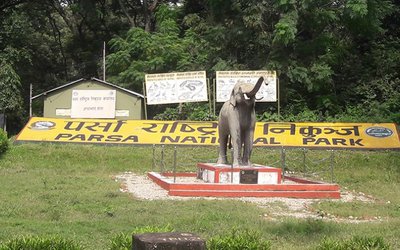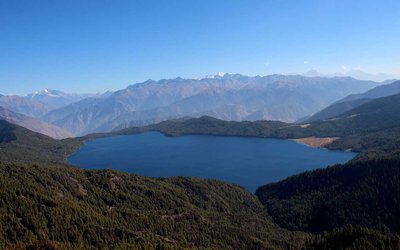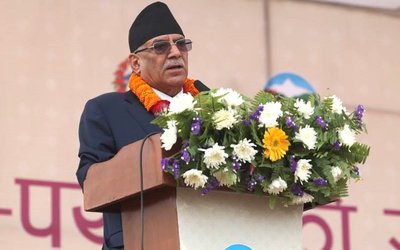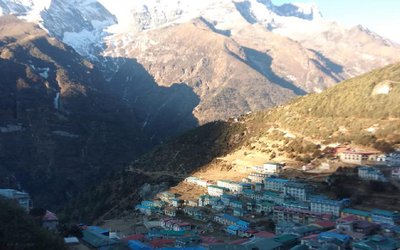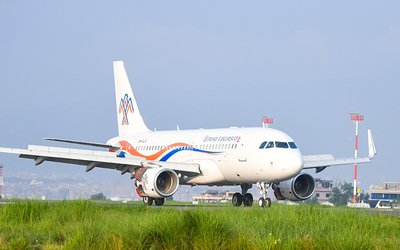I have been in China for two months. Stationed in Shanghai, I will live in my temporary home, Room No. 402 of HUAYI BUILDING of East China University of Political Science and Law, for ten months on a Chinese Government Scholarship, Yes-China program. The facilities and stipend I have are appreciable. Shanghai is the economic capital of China. There is a lot to be written about Shanghai, but later. This travelogue is about a brief sojourn in Beijing.
It takes around four hours and 48 minutes to reach Beijing from Shanghai. The cost is ¥553, one way for these high-speed trains. And the duration is different even between these trains depending upon how many stops they take. Yin, Kumari, Zarli and I arrived at Beijing at one past forty eight minutes in the afternoon on Thursday, 3 November 2016. Yin and U. booked rooms online at Days Inn Forbidden City, Beijing, in our presence the day we bought the tickets. The inception of the idea of our journey began with Kartika's desire to see Beijing. U. and Kartika are happily married with two children. U. and Kartika joined us at Beijing the next day on Friday.
Days Inn Forbidden City offered three rooms for us at three prices. The one I shared with Yin was worth ¥1880 till Monday. It came around ¥470 per night. Per person it was ¥235. After dumping our luggage in the room we decided to hit the streets as the high speed train journey was comfortable, so much so that we didn't need rest. We moved around and happened to enter Wangfujing street round about dinner time. It was Yin's idea that we went there. For us after wandering about nowhere having reached Wangfujing street was like coming in contact with 'civilization'. The neon lights and hustle and bustle of the place drew our attention and soon absorbed us into it. Soon we found ourselves walking into food street tasting the food. Sometimes disappointing because of the relatively over rated price and less than palatable to the tastebuds, but sometimes relishing the savories. We pushed ourselves through the intimidating crowd in street. As we walked on either side each food item looked just made for us. We also couldn't stop the temptation to shop for discounted clothes and indulged ourselves that evening.
Next stop - The Temple of Heaven. It is a huge park. The sacrifice for good harvest was done there during the imperial era. The main monument is an outstanding world heritage site. It's different from any of the Nepali or Indian architecture. It was my first experience of witnessing such an architecture. The visit was worth it. There are other things to witness in the park, some grand, others less so, on the whole conserved properly.
One item on Kumari's bucket list was visiting the Great Wall of China. We booked ourselves with a local tour agent for ¥160 each for the transportation, lunch and tickets for Great Wall of China, with a side visit to the Ming Tomb, and a 'drive past' of the Bird's Nest and Water Cube of the Olympic Stadium from the bus. Yin bargained the amount (as per usual standard practice here in China) and got it for forty yuan cheaper than the original quoted price for each of us. Yin is our Malaysian classmate who speaks Chinese. It was on Saturday we reached The Great Wall of China. We had to pay ¥100 extra for the cable car. This came as a last minute surprise. I was happy to pay the amount to experience the ride. We had two hours to witness, trek and experience the magnificence of one of the seven wonders of the world, which is both historical and beyond belief and comprehension. Constructed on the top of hilly range with steep slopes, the trek at the Great Wall of China was worth every effort and penny spent on a personal level. Harder to comprehend however, is the cost spent, hard labor and the lives lost to build the over 20,000 kilometers long stretch of the Great Wall, for the main purpose of defending an empire. Probably it reflects what human beings can do and what they will do to defend what they believe in.
Before going to the Great Wall we stopped by the Ming Tomb where Emperors and Empresses were laid to rest after their roles on earth were over. We had Chinese style lunch and visited a jade factory cum souvenir shop. Jade is of importance in China. I was made to believe that if one has jadeite one is worth something. On our way back we were given the opportunity to taste five different varieties of tea in a government run shop. Earlier Emperors and Empresses had tea there which was off limits for ordinary citizens. The different varieties of tea did taste 'royal'.
We didn't use any vehicle on Sunday but we were on the move the whole day. Forbidden City was next in the itinerary, followed by lowering of flag ceremony in Tiananmen Square. It was a whole day affair.
I took the audio tour guide hesitatingly. But it turned out to be a good investment and one of the most helpful tools to explore the grandeur and understand the mysterious ways of life in the Forbidden City during the imperial times. I could explore it on my own. The sound was clear and the information, description and narration of the stories were captivating. It enabled me to explore the palace museum independently. However, after a cursory visit I joined U., Kartika, Kumari, Zarli and Yin and moved around the palace at our own leisurely pace. It would take more than a whole day to fully appreciate everything that is conserved and protected there.
The richness of ancient China displayed in the palace museum clearly reflects the pride every Chinese bears in their soul. The pride that contributed to their fall too can be seen in the palace museum when nothing seemingly extraordinary was achieved during the last century or so. But China as an empire of a different kind is restored at present if we look at the cities like Shanghai and Beijing. There is nothing that these cities do not have that other international cities have. There is something for everyone. Of course not everyone can have everything. Desires are insatiable. And there is not even a thin line between our need and our greed.
Tired and famished towards the evening I was hoping the time to pass by quicker so that we could witness the lowering of the flag. Legs hurting and with tired body we stood and waited in front of Tiananmen Square for more than forty minutes before the ceremony started. The young guards standing there were a source of inspiration for me not to lose patience. They stood there the whole day without an expression of fatigue in their face or through their body language. The precision of their parade reflected discipline and accuracy. It was a sight worth witnessing. It lasted for around ten minutes. Tiananmen Square was full of people witnessing the military precision and ritual of lowering of the flag. The life in the Tiananmen area after that almost pin drop silence during the lowering of flag was again worth observing. During the lowering of the flag the traffic was stopped, the people gathered were spellbound and witnessing the ritual. The rhythmic sound of the soldiers' footsteps and the movement of the rifles awed everyone present there. Life came back to the area once the soldiers took away the folded flag across the street towards the Forbidden City. Probably to the Tiananmen Tower.
We had three agendas for Monday, the last day of our Beijing trip. Visit to Lama Temple, Peking University and Summer Palace. Our day started with a visit to Lama Temple. It is a very big complex with the main monasteries at the centre lined up one after another and at the sides there were smaller monasteries on either side completing and enclosing the complex. There are Buddha statutes in all sizes and shapes. The laughing Buddha certainly brought a smile to my face as I entered the first monastery. Smile is indeed contagious. When I thought it was just the laughing Buddha that I came to witness, as I exited, there was another monastery in line with the first one. Then there were a series of them, one after another, mesmerizing me with their grandeur and fulfilling my curious quest to see more. Finally when I saw the last statute which is at least three storey high, I was awestruck and didn't need to see another one. We cut short visit to Lama Temple after cursory observation. The time wasn't enough for us to explore the temple meticulously.
We were dumbfounded trying to comprehend the Peking University complex. There are ten canteens. Some can accommodate more than one thousand eaters at one time. Bijan informed us that the library boasts of four thousand students' sitting arrangement. The year 2005 record shows collection of six million books. We also went to the lake within the university. We were tempted to watch a movie at the theatre in the university but time is a better shepherd. We were goaded to Summer Palace which was just three stops north of Peking University by Metro. Metro makes life in Beijing really easy and accessible.
We went to Summer Palace in cold weather but it still didn't fail to appeal to us. After surveying the area and the lake within, I did feel the urge to be an emperor. I began to understand the essence of being an Emperor. It is definitely different from being a commoner. The Summer Palace tells stories of Emperors even today. It brings those imperial days alive and makes one feel 'royal'. A visit to Summer Palace is a must if one is at Beijing just to feel the royalty. We didn't have time but a day could easily be spent admiring and taking leisurely walk along the banks of the lake. One would be fortunate if the crowd isn't intimidating there. In China crowd could be intimidating sometimes.
To conclude, China is about past, present and future. The unique 'royal' feeling that I experienced being in Beijing may not be felt in other cities in China. Not even in Shanghai, the economic and post modern city of China.
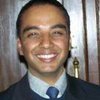
Abhishekh Adhikari
Adhikari is an advocate
- Once Again A Trip To Poonhill
- Mar 18, 2024
- A Trek To The Lesser Trodden Ruby Valley
- Mar 28, 2022
- A Complete Trip, Personally
- Jan 26, 2020
- Mesmerizing Mountains: Machhapuchure, Annapurna South and Himchuli
- Apr 18, 2019
- Climate Change: Think Globally Act Locally
- Jan 12, 2019


